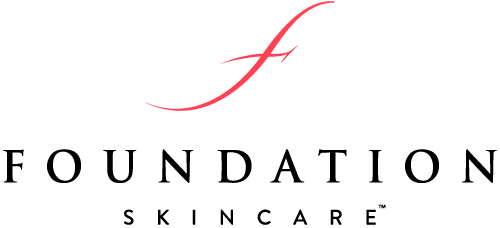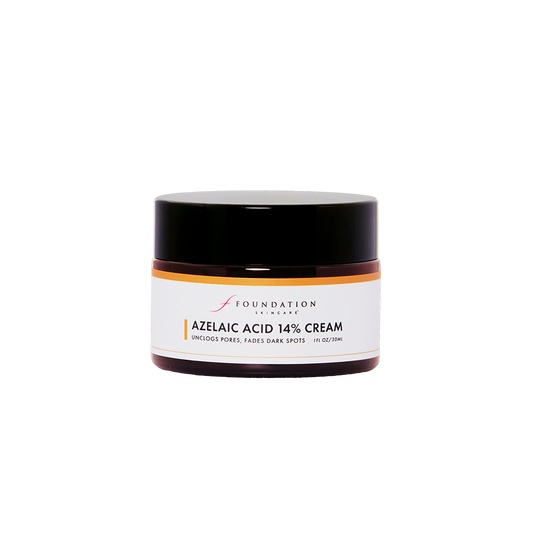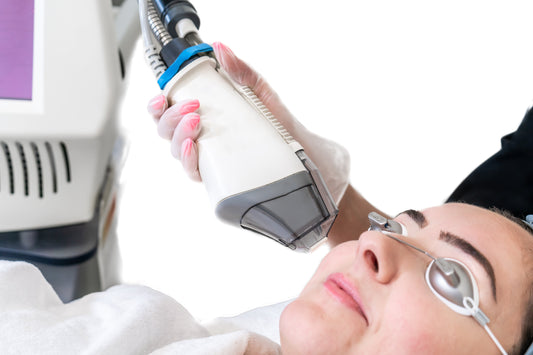Sunspots, age spots, dark spots–all of these words refer to hyperpigmentation, a condition that makes some areas of the skin darker than others, leading to an uneven skin tone.
There are a number of reasons why hyperpigmentation occurs and a number of treatments to help them fade away. Dr. Anthony Nuara, MD PhD FAAD is here to discuss the best ingredients for skin tone correction and how to adjust your skincare routine to prevent dark spots in the first place.
Overview of Dark Spots
Dark spots come in a variety of forms:
- Nevi (moles): Moles are caused by pigment-producing cells that form benign growths. These are largely genetic.
- Lentigines (freckles): Freckles are also largely genetic but induced by sunlight. They often appear at a young age.
- Solar lentigo (sunspots): Closely related to freckles, sunspots are also induced by the sun and appear in areas of excessive photodamage. They are typically larger than freckles and appear later in life as a result of excessive sun exposure.
- Macular seborrheic keratosis: These non-cancerous skin growths are genetic and sun induced, but are actually just patches of thicker skin which have the appearance of pigmentation.
- Melasma: These dark patches, which commonly appear on the forehead, cheeks, and cheekbones, are caused by hormonal shifts and sun exposure.
Understanding Skin Pigmentation
Melanocytes, or pigment-producing cells, are normally distributed evenly through the body independent of a person’s skin color. Skin color is largely dependent upon the amount and stability of the pigment that a person’s melanocytes make (known as melanosomes).
Dark spots represent an increase in the density of the pigment-producing cells as well as a focal increase in the amount of pigment they produce. This may happen due to skin cells becoming damaged due to sun exposure, injuries, or aging, or due to hormonal fluctuations. Hyperpigmentation is also more common in individuals with darker skin because they produce more melanin.1
Key Ingredients for Dark Spot Reduction
Products to help decrease pigmentation either interfere with pigment production or pigment stability. Some products, like hydroquinone, are toxic to melanocytes themselves, but also associated with a number of side effects like redness, dryness, and an increased risk of skin cancer.2
Niacinamide and azelaic acid are my favorite topical agents for pigment prevention and treatment. Niacinamide, a B vitamin with anti-inflammatory properties, helps fade dark spots and brighten skin by reducing melanin deposits. It also increases ceramides to strengthen the skin barrier and improves cellular energy production in the skin’s cells to help with DNA repair.
Azelaic acid, a natural byproduct of yeast, is commonly recommended for pigmentation disorders as well as mild rosacea, acne, and skin irritations due to its anti-inflammatory and antibacterial qualities. It also helps fade dark spots by inhibiting an enzyme called tyrosinase that leads to hyperpigmentation.3
Product Recommendations
Foundation Skincare offers a variety of products that can help reduce hyperpigmentation and potentially prevent it altogether. Find out which products you should integrate into your skincare and lifestyle routine and what other steps you can take to support dark spot removal.
Azelaic Acid 14% Cream
• Brightens skin, fades brown spots
• Unclogs pores, improves texture
Skincare Routine
Foundation Skincare Niacinamide Lotion 10% contains a powerful concentration of niacinamide, but is formulated to be gentle enough for even the most sensitive skin. It also contains hyaluronic acid to hydrate, moisturize, and prevent irritation, and organic aloe leaf juice, which calms the skin.
Foundation Skincare Azelaic Acid 14% Cream is considered medical grade because it contains the highest non-prescription percentage of azelaic acid. Many over-the-counter formulas contain a much lower amount which may not be strong enough to produce results, while many prescription formulas run the risk of drying out skin due to an even higher concentration. FS Azelaic Acid 14% Cream also contains tocopheryl acetate, a form of vitamin E, which helps to soften skin and protects cells from damage by neutralizing free radicals.
Recommended routine for hyperpigmentation (twice daily):
- Cleanse skin and pat dry.
- Apply FS Vitamin C Lotion 20%, which exfoliates dead skin cells for noticeably brighter skin. Like azelaic acid, it also blocks the action of tyrosinase.
- Apply a thin layer of FS Niacinamide Lotion 10%.
- Moisturize with FS Hyaluronic Acid Lotion.
- Apply a thin layer of FS Azelaic Acid 14% Cream all over your face while avoiding eyes, lips, and mouth.
- In the day, protect with minimum SPF 30+ (50 preferred) mineral-based broad spectrum sunscreen.
- In the evening, follow the same routine, but consider swapping sunscreen with FS Night Renewal Cream with 2% Granactive™ Retinoid to improve skin texture and fight premature signs of aging.
Lifestyle Routine
Practicing sun-safe habits is a crucial step you can take to protect your skin from hyperpigmentation and promote an even skin tone. In addition to using a sunscreen with a high SPF, ideally containing zinc, titanium, and iron oxide, you should aim to wear a hat outdoors and stay out of direct sunlight for prolonged periods of time.
While following a healthy diet is also important for healthy skin, taking a nutritional supplement can address nutritional gaps that leave you vulnerable to sun damage.
One of our favorite hyperpigmentation products is Foundation Skincare Pigmentation Defense, which contains a custom blend of antioxidants, vitamins and herbs proven to benefit pigmentary disorders. The supplement contains key ingredients like Polypodium leucotomos, a plant extract known to reduce the damaging effects of light on our DNA and skin cells,4 and alpha lipoic acid, a naturally-occurring antioxidant that blocks the UV damage that leads to pigment production.5 Other antioxidants that help to fade dark spots include ginkgo biloba, vitamin C, and vitamin E, which fight oxidative stress and repair tissue damage.
Expert Advice
Maintaining healthy skin and minimizing signs of hyperpigmentation should be approached from the inside out. Combining topical products with a nutritional supplement will give you the building blocks your body needs to fade dark spots and prevent the UV damage that instigates them.
Common Mistakes to Avoid
Some common mistakes to avoid when attempting to reduce dark spots include:
- Forgetting to wear sunscreen (SPF 30 or higher) and reapplying throughout the day and wearing sun-protective clothing every day, even on cloudy days
- Switching up products too quickly or being inconsistent with daily application
- Not addressing the root causes of your hyperpigmentation (sun exposure, hormonal imbalances, etc.)
- Continuing to use harsh ingredients that irritate skin
- Attempting to pop pimples, which can lead to injury and scarring
Dark spots don’t have to be inevitable. With the right plan in place, you can have healthy skin all year long. Find more skincare solutions in the FS Journal.
References:
-
https://skinofcolorsociety.org/patient-dermatology-education/post-inflammatory-hyperpigmentation-pih
-
https://www.medscape.com/viewarticle/979800
-
https://www.bannerhealth.com/healthcareblog/teach-me/azelaic-acid-and-its-benefits
-
https://www.ncbi.nlm.nih.gov/pmc/articles/PMC9861608
-
https://www.ncbi.nlm.nih.gov/pmc/articles/PMC8789419






